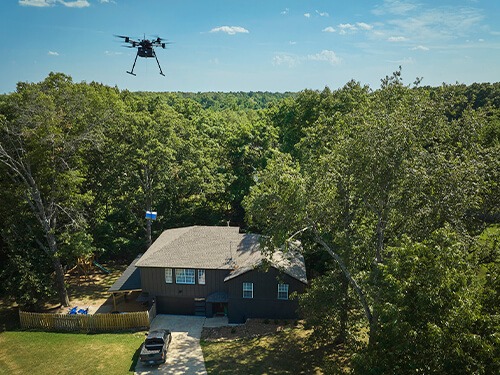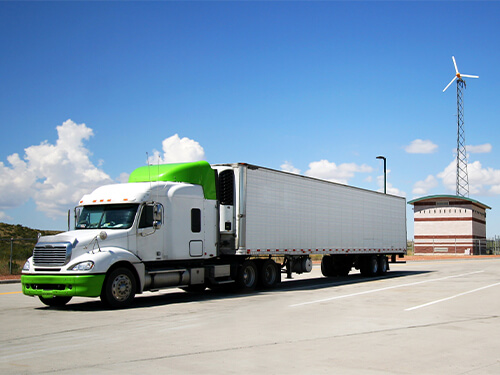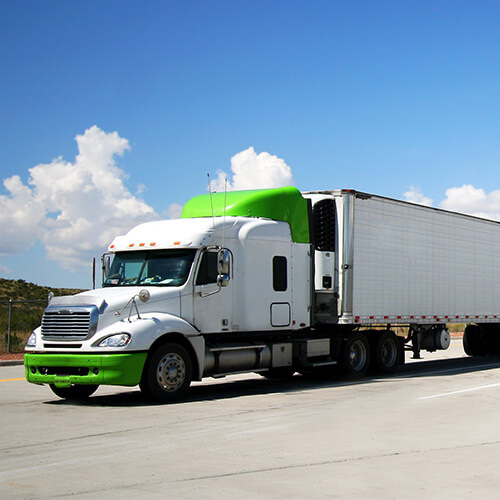
Through a sustainable partnership platform, the D2D Coalition is accelerating next-generation innovation to enable connectivity, sustainability, resiliency, and equitability. The following program areas highlight our commitment to building a better supply chain:

Data Sharing Platform for Freight Flow Connectivity & Visibility
Coordination of freight flow through an interconnected and advanced decision-making platform to track goods and optimize delivery.
A connected supply chain requires a robust and transparent decision support system prioritizing movement of goods visibility. The Coalition’s approach will optimize freight movement by providing dashboard tracking and robust decision support systems to optimize freight and vehicle loads. Modeled after the Fenix 2.0 Network and lessons learned from participants within the FLOW initiative, D2D will create a decentralized federated data sharing platform for sharing data securely between Coalition members that is particularly beneficial to transport and logistics operators. This project will demonstrate the coordination of a set of shipments from dock to door and assess the resulting economic, customer service, environmental, social equity, and workforce benefits.
The Coalition unites shippers, transportation providers, cities and authorities, transportation management, software providers, and customers. Together, we will enable secure and private connections for data sharing while capturing traditional and non-traditional sources and improving metrics such as freight arrival time and travel speed according to real-time port and hub schedules. Expected outcomes include reduced congestion and queuing times at each supply chain level and improved decision-making through forecasting and strategic scenario planning.
With this platform as a backbone, the coalition will drive use-inspired and socially equitable technology development in the key topic areas of automation, freight decarbonization, secure communications, and freight movement optimization.

Connected & Automated Vehicles Throughout the Supply Chain
Multi-modal automation and seamless connectivity to increase transportation safety and environmental sustainability, minimize congestion, and impacts of driver and worker shortages, while generating new job opportunities (e.g., remote operators for drayage) and improving worker health and safety.
We will expand the benefits of last-mile delivery beyond high-density metropolitan regions to rural and suburban areas. We will spearhead the installation and operation of a ubiquitous vehicle-to-everything (V2X) communications network along the corridor, which is key to enabling the deployment of automated trucks. We will optimize automated ground delivery methods to ensure equitable and accessible options for rural communities. Human-serving automation promises improved freight safety, performance, efficiency, and social equity (e.g., by moving goods swiftly to warehouses, communities, and individuals in disadvantaged and rural communities). Through this initiative, the Coalition will accelerate the deployment of automated ground and aerial vehicles for last-mile delivery and offer remote operator job opportunities.

Carbon-Neutral & Sustainable Freight
Advancing vehicle decarbonization throughout the supply chain to decrease air emissions for improved sustainability and quality of life.
The transportation sector is a significant contributor to planet-warming emissions. Additionally, emissions from vehicles have been known to cause significant environmental and health impacts, especially to disadvantaged communities near heavily trafficked freight corridors. The coalition seeks to address these issues, with a special emphasis on the critical freight corridors of I-64, I-77, I-81, and I-95.
Our region is positioned to be a global leader in next-generation clean transportation infrastructure systems. These systems will radically reduce carbon emissions, accelerate access to charging and alternative fuel stations across industries, and create workforce opportunities in emerging fields.
Through this effort, the coalition will work towards:
- Accelerating the deployment of electric vehicle stations for short-haul delivery light vehicles through the VDOT NEVI program along the I-64, I-77, I-81, and I-95 corridors.
- Developing affordable and accessible medium- and heavy-vehicle charging and fueling station hubs along important regional freight corridors to accelerate fleet electrification and conversion to alternative fuels.
- Scaling up implementation of charging and alternative fueling stations along the corridor in response to light, medium, and heavy vehicles’ conversion to alternative fueling sources.
In addition to infrastructure, we will accelerate AV2X communication networks. We will spearhead the installation and operation of a ubiquitous V2X communications network along the corridor. The communication of accurate fueling infrastructure information will help accelerate adoption and optimize route stops while minimizing down time. Through this project, we will lay the foundation for a carbon-neutral supply chain with the initial deployment of hydrogen-fueled and electric heavy vehicles along the port-to-hub highway corridor.

Workforce Development & Community Engagement
Promoting equity, education, training, and job opportunities all along the supply chain in a way that supports healthy communities, economies, and the environment.
The D2D Workforce Development and Community Engagement program encourages collaboration across our industry, academic, government, and non-profit partners in a way that fosters equitable access to supply chain job opportunities and meets the needs of new technology deployments. For example, facilitating the development of training for electricians to work on electric vehicle charging stations or for safety remote operators to perform automated ground delivery. The mission of the D2D Workforce Development and Community Engagement program is to promote equity, education, training, and job opportunities within the supply chain in a way that supports the well-being of our local communities, economies, and the environment.
Our strategic program area objectives are:
- Workforce Development: Facilitating the development of education and training programs that equip individuals with the skills required for current and future supply chain roles.
- Community Engagement: Conducting outreach with local communities to identify their priorities and challenges.
- Equitable Economic Opportunities: Supporting the creation of pathways for meaningful employment that support economic growth and reduce disparities.
- Environmental Stewardship: Promoting green initiatives within the supply chain to minimize ecological impact and support healthy living environments.



